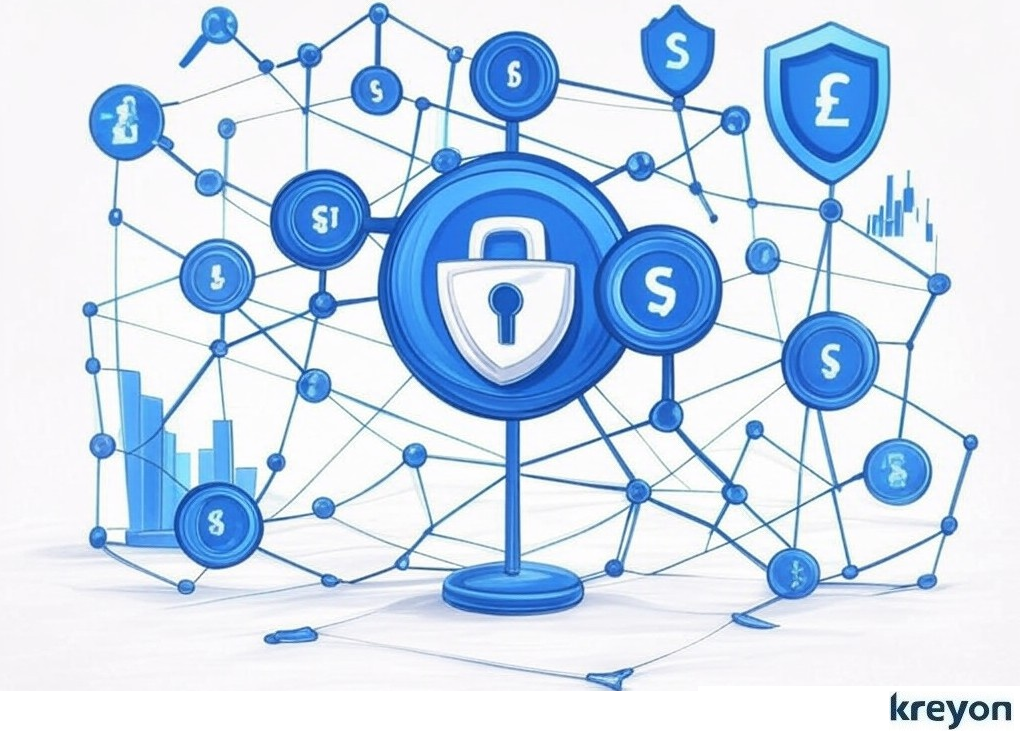Blockchain in Finance: Protecting Financial Data in the Digital Systems

Why use blockchain in finance? The financial world is undergoing a seismic shift, driven by the rise of digital technologies. While this digital revolution offers unprecedented convenience and efficiency, it also brings with it a heightened risk of data breaches and cyberattacks.
This is where blockchain technology emerges as a powerful tool, offering a secure and transparent foundation for the future of finance. The digital shift also brings with it concerns around security and privacy, particularly in how sensitive financial data is stored and transmitted.
With cybercrime on the rise and data breaches becoming more frequent, the need for a more secure, transparent, and immutable system has never been more urgent.
Blockchain technology that has emerged as a game-changer in the financial sector, offering enhanced protection for financial data in digital systems. Here’s how:
Blockchain in Finance
At its core, blockchain is a decentralized database or ledger that records transactions across multiple computers in a way that ensures that the information is secure, transparent, and tamper-proof.
Each “block” in the blockchain contains a list of transactions, and these blocks are linked together in a chain, creating a continuous, immutable record of data.
This distributed nature eliminates the need for intermediaries, such as banks or clearinghouses, making transactions more efficient and secure.
Here are some key characteristics of blockchain that make it ideal for financial applications:
Decentralization: Unlike traditional centralized systems where data is stored in one location, blockchain operates across a network of computers (nodes), meaning no single entity has control over the entire system.
Immutability: Once data is recorded on the blockchain, it cannot be altered or erased. This prevents fraud and unauthorized manipulation of financial data.
Transparency: All transactions are visible to participants in the network, ensuring accountability and reducing the risk of fraudulent activities.
Security: Blockchain uses advanced cryptographic techniques to secure data, making it extremely difficult for hackers to tamper with the information.
In the context of financial systems, blockchain’s ability to offer these key features makes it an ideal tool for protecting sensitive financial data in digital systems.
The Growing Need for Data Protection in Financial Systems
Financial institutions have long been a prime target for cybercriminals, with vast amounts of sensitive customer data and monetary transactions being handled daily.
Cyberattacks, data breaches, and identity theft are some of the most significant threats facing financial institutions today. According to a report by Accenture, the financial services industry faces an average of 125 cyberattacks per year, resulting in massive financial losses and damage to the institution’s reputation.
Moreover, the increasing amount of personal and financial data being shared online, coupled with the rise of digital banking, mobile payments, and cryptocurrency transactions, has created new vulnerabilities that require sophisticated security measures.
In particular, the traditional centralized data systems that most financial institutions rely on are highly susceptible to cyberattacks and hacking attempts. A breach of such systems can lead to the theft of personal data, financial loss, and loss of customer trust.
Blockchain in finance offers a promising solution to these challenges by providing a highly secure, decentralized alternative that reduces the risks associated with centralized data storage and transmission.
How Blockchain Protects Financial Data
1. Decentralization Reduces Single Points of Failure
One of the key strengths of blockchain is its decentralized nature. In traditional financial systems, data is often stored on a central server or database, making it vulnerable to attacks. If a hacker gains access to this central repository, they can manipulate or steal sensitive financial information.
In contrast, blockchain stores data across a network of computers (nodes), so there is no single point of failure. Even if one node is compromised, the data on the blockchain remains secure because it is duplicated and validated across the network.
This decentralized structure makes it much harder for cybercriminals to compromise the entire system, providing greater protection for financial data.
2. Immutability Ensures Data Integrity

One of the most compelling features of blockchain is its immutability. Once a transaction is added to the blockchain, it cannot be changed or deleted.
This is achieved through cryptographic hashing, where each block in the chain contains a unique cryptographic hash of the previous block, along with a timestamp and transaction data. This creates a secure chain of blocks that is resistant to tampering.
In the context of financial data, this immutability ensures that once transactions are recorded, they cannot be altered or erased. This feature is particularly valuable for preventing fraudulent activities, such as altering financial records, manipulating transaction histories, or falsifying account balances.
It provides a high level of data integrity, which is crucial for maintaining trust and compliance in the financial sector.
3. Enhanced Privacy with Cryptographic Security
Blockchain uses advanced cryptographic techniques to secure financial data and transactions. Each participant in the blockchain network has a unique cryptographic key pair—a public key and a private key.
The public key is used to identify the participant and is visible to others in the network, while the private key is kept secret and used to sign transactions.
When a financial transaction is initiated on the blockchain, it is encrypted using the sender’s private key, ensuring that only the intended recipient can decrypt the transaction with their corresponding public key.
This level of encryption ensures that sensitive financial data, such as account details, transaction amounts, and personal information, remains confidential and protected from unauthorized access.
In addition, many blockchain platforms are exploring the use of zero-knowledge proofs (ZKPs), which allow for the verification of data without revealing the actual data itself. This can further enhance privacy while maintaining transparency in the system.
4. Transparent and Auditable Transactions
While blockchain offers enhanced privacy, it also provides transparency that is essential for auditing and regulatory compliance in financial systems. All transactions on the blockchain are recorded in a public ledger that is accessible to participants in the network.
This means that financial transactions can be traced and verified in real time.
For financial institutions, this transparency reduces the likelihood of fraud, as all participants can see the transaction history and ensure that it is legitimate.
Furthermore, blockchain’s immutable record of transactions makes it easier to audit financial activities, ensuring compliance with regulations such as Anti-Money Laundering (AML) and Know Your Customer (KYC) requirements.
Regulators can use the blockchain’s transparent ledger to trace the flow of funds and detect suspicious activities, making it a powerful tool for enhancing financial security and trust.
5. Protection Against Fraud and Identity Theft

Blockchain’s security features make it an effective tool for combating fraud and identity theft, two of the most significant risks in digital finance.
In traditional systems, fraudulent activities often occur when hackers gain access to personal or financial data stored in centralized databases.
Blockchain’s decentralized nature makes it much harder for cybercriminals to target individual accounts, and its immutability prevents fraudulent transactions from being altered or erased.
Furthermore, blockchain’s cryptographic security ensures that only authorized individuals can access and approve financial transactions.
This reduces the risk of unauthorized transactions and identity theft, providing customers with greater confidence in the security of their financial data.
6. Decentralized Finance & Asset Management:
Financial data, which includes everything from personal banking details to complex trading algorithms, demands the highest level of security.
Assets can be tokenized on a blockchain, representing ownership of physical or digital assets. This provides a clear, immutable record of ownership which can be crucial in asset management and disputes.
Blockchain can be used to automate compliance with regulations through smart contracts, ensuring that all transactions meet legal standards automatically ensuring compliance as per regulatory norms. For e.g. Using escrow systems to release payments only upon confirmation of certain events, like delivery authentication in case of ecommerce.
The decentralization of finance is booming, offering financial services without traditional intermediaries, leveraging blockchain for everything from lending to insurance.
The Future of Finance: A Blockchain-Powered Ecosystem

Despite these challenges, the potential of blockchain to transform the financial world is undeniable. As technology continues to evolve and regulatory frameworks mature, we can expect to see increasing adoption of blockchain across a wide range of financial applications.
The future of finance is likely to be characterized by a decentralized and interconnected ecosystem powered by blockchain technology. This will lead to more efficient, secure, and transparent financial systems that benefit individuals, businesses, and global institutions.
Conclusion
Blockchain technology is revolutionizing the financial sector by providing an innovative and secure way to protect financial data in digital systems. It ensures that sensitive financial data is kept secure, reduces the risk of fraud and identity theft, and enables greater regulatory compliance.
As financial institutions continue to embrace digital transformation, blockchain will play an increasingly important role in safeguarding financial data and building trust with customers.
By leveraging blockchain’s unique capabilities, the financial industry can create a more secure, transparent, and efficient environment for financial transactions, paving the way for the future of finance.
Kreyon Systems offers unparalleled security and cutting-edge blockchain solutions. Access new financial products & services with enhanced accessibility with us, if you have any queries contact us.
